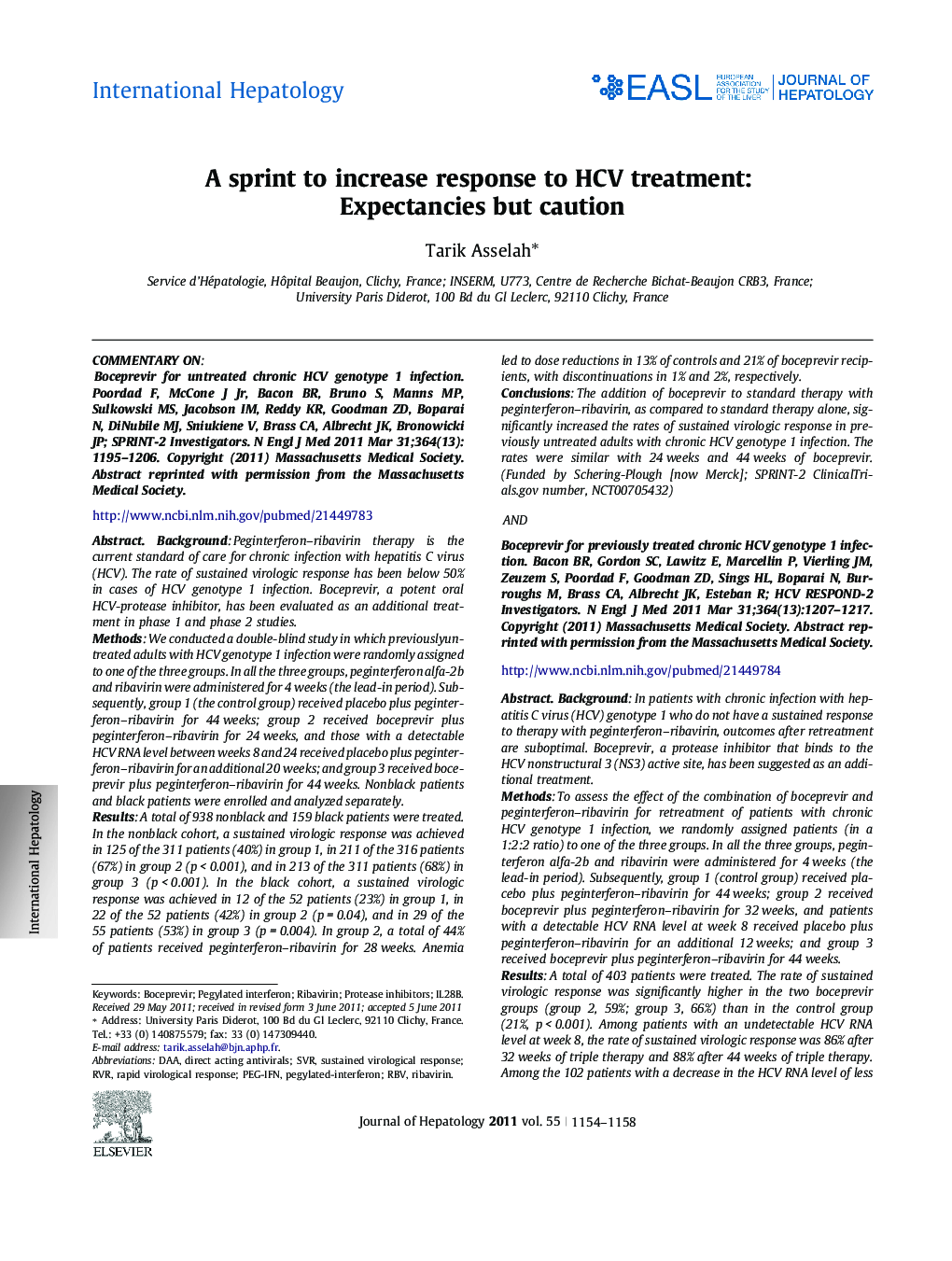| کد مقاله | کد نشریه | سال انتشار | مقاله انگلیسی | نسخه تمام متن |
|---|---|---|---|---|
| 6105944 | 1211154 | 2011 | 5 صفحه PDF | دانلود رایگان |

COMMENTARY ONBoceprevir for untreated chronic HCV genotype 1 infection. Poordad F, McCone J Jr, Bacon BR, Bruno S, Manns MP, Sulkowski MS, Jacobson IM, Reddy KR, Goodman ZD, Boparai N, DiNubile MJ, Sniukiene V, Brass CA, Albrecht JK, Bronowicki JP; SPRINT-2 Investigators. N Engl J Med 2011 Mar 31;364(13):1195-1206. Copyright (2011) Massachusetts Medical Society. Abstract reprinted with permission from the Massachusetts Medical Society.http://www.ncbi.nlm.nih.gov/pubmed/21449783Abstract. BackgroundPeginterferon-ribavirin therapy is the current standard of care for chronic infection with hepatitis C virus (HCV). The rate of sustained virologic response has been below 50% in cases of HCV genotype 1 infection. Boceprevir, a potent oral HCV-protease inhibitor, has been evaluated as an additional treatment in phase 1 and phase 2 studies.MethodsWe conducted a double-blind study in which previouslyuntreated adults with HCV genotype 1 infection were randomly assigned to one of the three groups. In all the three groups, peginterferon alfa-2b and ribavirin were administered for 4 weeks (the lead-in period). Subsequently, group 1 (the control group) received placebo plus peginterferon-ribavirin for 44 weeks; group 2 received boceprevir plus peginterferon-ribavirin for 24 weeks, and those with a detectable HCV RNA level between weeks 8 and 24 received placebo plus peginterferon-ribavirin for an additional 20 weeks; and group 3 received boceprevir plus peginterferon-ribavirin for 44 weeks. Nonblack patients and black patients were enrolled and analyzed separately.ResultsA total of 938 nonblack and 159 black patients were treated. In the nonblack cohort, a sustained virologic response was achieved in 125 of the 311 patients (40%) in group 1, in 211 of the 316 patients (67%) in group 2 (p < 0.001), and in 213 of the 311 patients (68%) in group 3 (p < 0.001). In the black cohort, a sustained virologic response was achieved in 12 of the 52 patients (23%) in group 1, in 22 of the 52 patients (42%) in group 2 (p = 0.04), and in 29 of the 55 patients (53%) in group 3 (p = 0.004). In group 2, a total of 44% of patients received peginterferon-ribavirin for 28 weeks. Anemia led to dose reductions in 13% of controls and 21% of boceprevir recipients, with discontinuations in 1% and 2%, respectively.ConclusionsThe addition of boceprevir to standard therapy with peginterferon-ribavirin, as compared to standard therapy alone, significantly increased the rates of sustained virologic response in previously untreated adults with chronic HCV genotype 1 infection. The rates were similar with 24 weeks and 44 weeks of boceprevir. (Funded by Schering-Plough [now Merck]; SPRINT-2 ClinicalTrials.gov number, NCT00705432)ANDBoceprevir for previously treated chronic HCV genotype 1 infection. Bacon BR, Gordon SC, Lawitz E, Marcellin P, Vierling JM, Zeuzem S, Poordad F, Goodman ZD, Sings HL, Boparai N, Burroughs M, Brass CA, Albrecht JK, Esteban R; HCV RESPOND-2 Investigators. N Engl J Med 2011 Mar 31;364(13):1207-1217. Copyright (2011) Massachusetts Medical Society. Abstract reprinted with permission from the Massachusetts Medical Society.http://www.ncbi.nlm.nih.gov/pubmed/21449784Abstract. BackgroundIn patients with chronic infection with hepatitis C virus (HCV) genotype 1 who do not have a sustained response to therapy with peginterferon-ribavirin, outcomes after retreatment are suboptimal. Boceprevir, a protease inhibitor that binds to the HCV nonstructural 3 (NS3) active site, has been suggested as an additional treatment.MethodsTo assess the effect of the combination of boceprevir and peginterferon-ribavirin for retreatment of patients with chronic HCV genotype 1 infection, we randomly assigned patients (in a 1:2:2 ratio) to one of the three groups. In all the three groups, peginterferon alfa-2b and ribavirin were administered for 4 weeks (the lead-in period). Subsequently, group 1 (control group) received placebo plus peginterferon-ribavirin for 44 weeks; group 2 received boceprevir plus peginterferon-ribavirin for 32 weeks, and patients with a detectable HCV RNA level at week 8 received placebo plus peginterferon-ribavirin for an additional 12 weeks; and group 3 received boceprevir plus peginterferon-ribavirin for 44 weeks.ResultsA total of 403 patients were treated. The rate of sustained virologic response was significantly higher in the two boceprevir groups (group 2, 59%; group 3, 66%) than in the control group (21%, p < 0.001). Among patients with an undetectable HCV RNA level at week 8, the rate of sustained virologic response was 86% after 32 weeks of triple therapy and 88% after 44 weeks of triple therapy. Among the 102 patients with a decrease in the HCV RNA level of less than 1 log(10) IU per milliliter at treatment week 4, the rates of sustained virologic response were 0%, 33%, and 34% in groups 1, 2, and 3, respectively. Anemia was significantly more common in the boceprevir groups than in the control group, and erythropoietin was administered in 41-46% of boceprevir-treated patients and 21% of controls.ConclusionsThe addition of boceprevir to peginterferon-ribavirin resulted in significantly higher rates of sustained virologic response in previously treated patients with chronic HCV genotype 1 infection, as compared to peginterferon-ribavirin alone. (Funded by Schering-Plough [now Merck]; HCV RESPOND-2 ClinicalTrials.gov number, NCT00708500).
Journal: Journal of Hepatology - Volume 55, Issue 5, November 2011, Pages 1154-1158